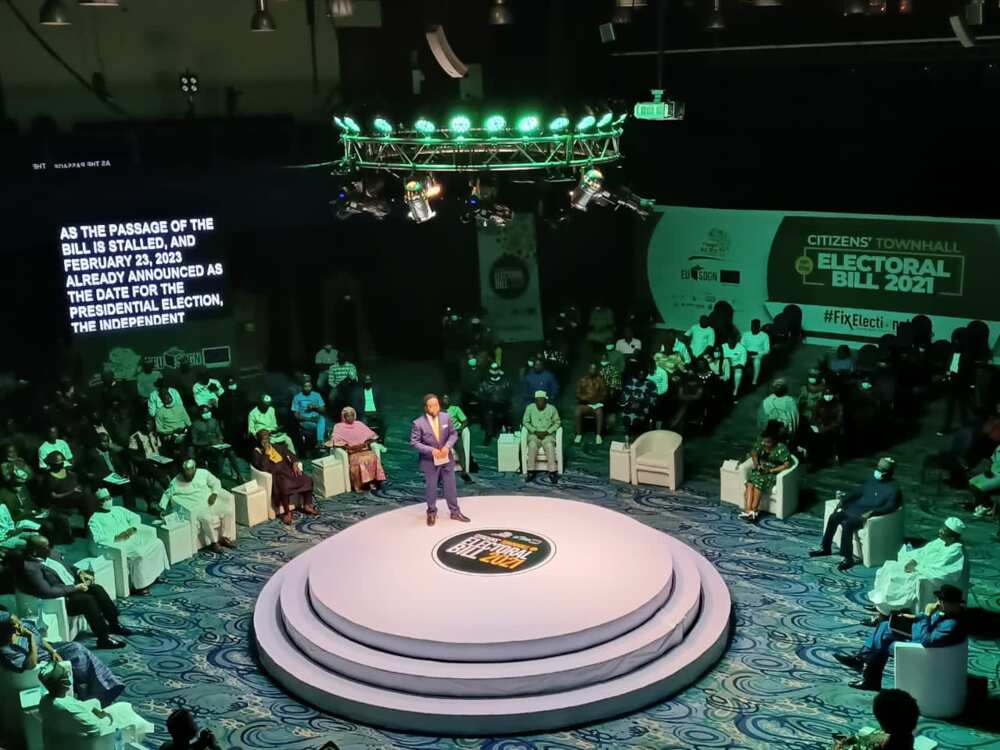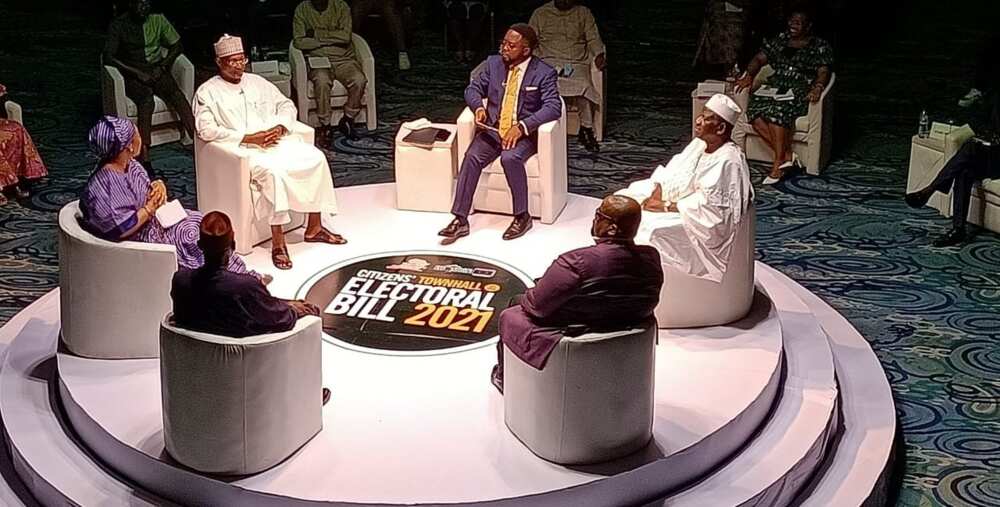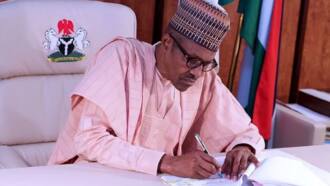Electoral Bill: Citizens Townhall Puts Pressure on National Assembly, Presidency
As at 5 pm on a breezy Sunday evening, January 16, participants started strolling into the Congress Hall of Transcorp Hilton Hotel, Abuja to be part of history as a citizens town hall on the Electoral Bill 2021, organised by YIAGA Africa was about to commence.
Prominent among the early callers were Hon. Nnenna Ukeje, a former House of Representatives member, Ene Obi, ActionAid Nigeria's Country Director, and Professor Attahiru Jega, a former chairman of the Independent National Electoral Commission (INEC).
Inside the hall, the stage was set with television cameras from Nigeria's major national television stations prepared to beam the event live to Nigerians.
Outside the hall, social media was buzzing with Nigerians joining the conversation with the hashtag #FixElectionsNG.

Source: Facebook
Setting the ball rolling on the night was Samson Itodo, Executive Director of Yiaga Africa, who opened the floodgates of conversations with a recorded message to the audience and Nigerians in general.
PAY ATTENTION: Subscribe to Digital Talk newsletter to receive must-know business stories and succeed BIG!
Itodo, the 2018 Young Person of The Year at the Future Awards, said:
“Nigerians clamour for the speedy conclusion of the electoral amendment process to facilitate early preparations and eschew legal uncertainties that make the electoral process susceptible to manipulations.
“As long as the electoral reform process is inconclusive, Nigeria is losing an opportunity to test the efficacy of new innovations introduced in the electoral bill, especially during the off-cycle elections in FCT, in Ekiti and Osun, and before deployment for the 2023 general elections.
“It is for this reason that Yiaga Africa and our partners are hosting this townhall to highlight landmark provisions in the bill and to demand the speedy conclusion of the electoral amendment process ahead of the resumption of the National Assembly from recess.”
On her part, Samuela Isopi; EU ambassador to Nigeria and ECOWAS, described the townhall as 'an important and timely event.'
She noted that the strength of a country's democracy depends on the quality of its electoral process and on the mobilisation of its citizens.
Her words:
“A lot has already been achieved but a lot also remains to be done. We feel confident that today's townhall will contribute to the debate and to a successful conclusion of the process.”
Isopi's hope that the process will be successfully concluded is what brought all the heavyweights of key democratic institutions into the packed hall, as the controversy about direct primaries in the bill is threatening to stall the process.

Source: Twitter
How a controversial clause threatens the 2021 Electoral Bill
President Muhammadu Buhari had in December 2021 declined assent to the Electoral Act Amendment bill, stating that signing it into law would cause trouble among the political parties in the country.
In a letter to the President of the Senate, Senator Ahmad Lawan, Buhari said a clause in the amended Electoral Act which provides for direct primaries for political parties to pick their candidates is dangerous to Nigeria's political atmosphere.
Speaking to Channels Television on his stance days later, the president said Nigerians should be given options and allowed to decide what they want.
His words:
“No. I am not going to support it. Personally, I don’t support direct primaries because I want people to be given a choice. You can’t give them one option and think you are giving them democracy. Let’s have the three options — direct, indirect, and consensus.”
Speaking on the issue, Yiaga Africa's Director of Programmes, Cynthia Mbamalu lamented that:
“We have reduced this conversation to just issues about direct and indirect primaries. But there is a lot more.”
She cited funding for elections, the ability for INEC to review election results, reduction of election cases going to court as some of the important reasons why the bill should be passed into law.
According to her, if the bill is not passed, it will affect confidence in the electoral process and have a direct impact on the quality of elections among others.
Professor Jega's take on the Electoral Bill
Mbamalu's concerns were shared by a former INEC chairman, Professor Attahiru Jega who accused the National Assembly of turning democracy to plutocracy.
His words:
“What they are doing is that they are turning our democracy into plutocracy; government of the rich, for the rich and by the rich; it’s a very serious problem.”
He added:
“Some people believe that governors do influence the outcome of indirect primaries and some feel direct primaries is a way out of this, but the question is, how many parties have a credible register of members?
“Give INEC the law to begin preparations for the 2023 elections. Any governor that manipulates direct primaries under this present condition will also have the capacity to manipulate indirect primaries.”
Nigerians suspect conspiracy against electoral reforms
In a rather interesting twist, some Nigerians at the event suggested that the introduction of direct primaries in the bill was part of a conspiracy to ensure that it was not signed into law.

Read also
FG in trouble as coalition set to mobilise Nigerians to resist gas, fuel hikes, electricity tariffs
The national chairman of the Inter-Party Advisory Council Nigeria, Ahaji Sani Yabagi, who is equally chairman of the African Democratic Party, alleged that the ruling All Progressives Congress (APC), which controls both the executive and legislative arms of government, was not comfortable with electronic transmission of election results.
Yabagi further alleged that the conspiracy against the bill was aimed at frustrating electoral reforms in the country by aborting the introduction of electronic transmission in the electoral act.
Olumide Akpata, the president of the Nigerian Bar Association (NBA), agrees with Yabagi, saying says the issues delaying the approval of the electoral bill may be a smokescreen to keep the present provisions for the 2023 polls.
His words:
“Mr. President has pointed out these issues of direct or indirect primaries. He had decided that on the basis of that, he is sending it back to the national assembly.
“I think that we can be forgiven when we conclude if this is a smokescreen of some sort and that there is a spanner thrown in the works to keep us in the moment so that we will stay with the present dispensation because this is something that could easily have been fixed.
“Mr. President is of the same party as those who control the national assembly. If our leaders are interested in the progress for the people and for the nation, these are house issues that could have been sorted out by those in charge of affairs in both arms of government.”
Professor Remi Sonaiya, a former presidential candidate said:
“We are doing ourselves a huge disservice if we approach the electoral bill amendment focusing on just the direct primaries. The bill offers so much more.”
Nasarawa state governor, Abdullahi Sule defends his colleagues
The governor of Nasarawa state, Abdullahi Sule, however, dismissed insinuations suggesting that the 36 state governors in Nigeria are afraid of direct primaries.
He also disclosed that the state governors do not want to be boxed into a corner by the options of direct primaries.
His words:
“It is false to say the governors are against the Electoral Bill 2021. The governors are not against the electoral bill, they only want an option of direct or indirect primaries and not having to stick with one.”

Read also
2023: 84 Yoruba groups meet, set to conduct southwest opinion poll on presidential aspirants
Seven key resolutions from the citizens’ townhall
At the end of the event, there were seven key resolutions from the townhall which are:
1. A new legal framework is central to the integrity of 2023 general elections and future elections and the advancement of Nigeria’s democracy.
2. Against the background of the changing electoral environment and innovations introduced by INEC to enhance electoral integrity, it is inconceivable to conduct the 2023 general election and future elections with the current legal framework, the 2010 Electoral Act as amended.
3. The Electoral Bill 2021 reflect the wishes of Nigerians and key electoral stakeholders for a legal framework that promotes the use of technology and other innovations to stem electoral manipulation, strengthens INEC’s financial independence, and empowers the Commission to reject falsified election results.
4. Further delay to conclude the Electoral Act amendment process is inimical to the preparations for Ekiti and Osun's off-cycle governorship election, the 2023 general election, and future elections.
5. The opportunity to test the operability of the new legislation and functionality of the new innovations will be lost if the amendment process is not concluded expeditiously.
6. With only 398 days to the 2023 general election, it is crucial for the National Assembly and President to conclude the electoral amendment process by 31 January 2022.
7. The National Assembly should remove the contentious clause of direct primaries, resolve all the identified drafting errors and cross-referencing gaps and re-transmit the bill to the President for assent within a week of resumption.
Four key recommendations from the townhall
1. The Senate and House of Representatives should upon resumption on Tuesday 18 January 2022, take legislative action at its first sitting to conclude the process and re-transmit the bill to President Buhari by Friday, January 21, 2022.
2. The National Assembly should ensure proper scrutiny of the bill to resolve all drafting errors and cross-referencing gaps before re-transmitting the bill for Presidential Assent.
3. The President should upon receipt of the re-transmitted bill provide his assent within a week.
4. Civil society groups, media, and development partners sustain the effort to safeguard the Electoral Bill from policy capture, manipulation, and subversion of the people’s will.
As the nation awaits the resumption of the National Assembly on Tuesday, January 18, Nigerians expect that work on the electoral amendment bill will be the priority issue on the order.
Source: Legit.ng







